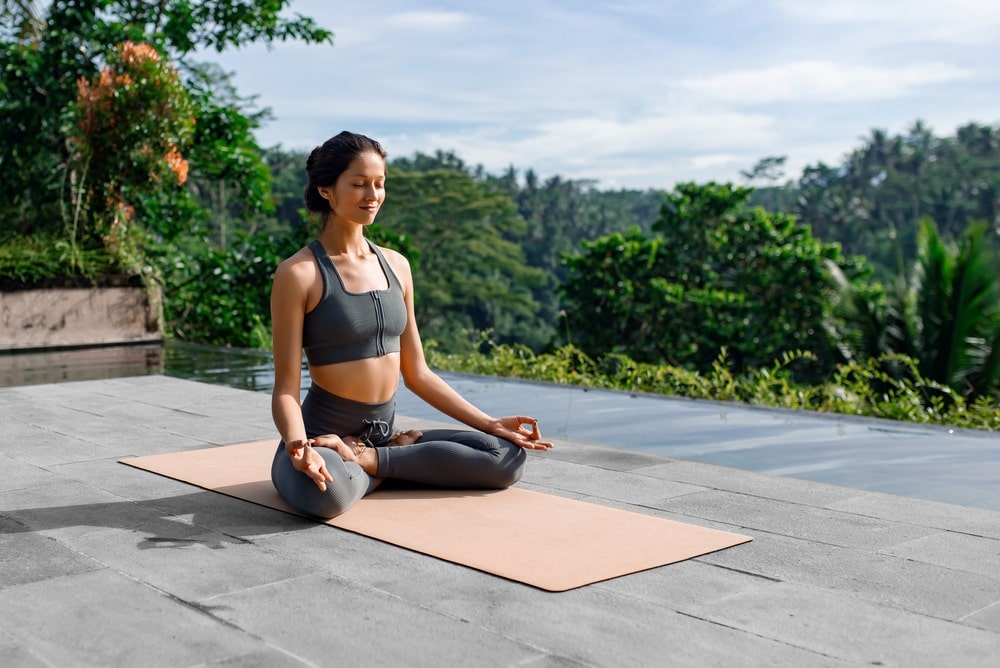Anxiety can be explained as “the body’s automatic fight-or-flight response that is triggered when you feel threatened, under pressure, or are facing a challenging situation.” It is the body’s natural response to stress. The feelings of anxiety can range from mild to severe, and it is helpful to learn strategies to manage toxic stress when it presents. Yoga, for example, has been widely recognized for its positive effects on mental health, including anxiety management. It is an ancient and complex spiritual practice developed over 5,000 years ago that is rooted in Indian philosophy. As per Yogic scriptures, the practice of yoga is based on an extremely subtle science, which focuses on bringing harmony between mind and body. Classical yoga typically emphasizes physical postures (asanas), breathing techniques (pranayama), and meditation (dhyana). Medical News Today highlights various benefits of practicing yoga for individuals dealing with anxiety, some of which include the following key advantages:
- Stimulates relaxation: Yoga activates the body’s relaxation response, triggering the parasympathetic nervous system. This response counteracts the stress-induced fight-or-flight response, promoting a state of relaxation and calmness. Scandinavian researchers measured brain waves before and after a 2-hour yoga class and found that alpha waves (relaxation) and theta waves (unconscious memory, dreams, emotions) increased significantly, which indicates that the brain is deeply relaxed after yoga.
- Encourages physical exercise: Engaging in the physical postures of yoga provides a gentle form of exercise. Regular physical activity has been shown to release endorphins, which are natural mood boosters. This can contribute to a more positive mental state and help alleviate symptoms of anxiety.
- Promotes mindfulness: Yoga incorporates mindfulness and meditation practices, which are effective tools for managing anxiety. According to the Mayo Clinic, mindfulness involves focusing on “being intensely aware of what you’re sensing and feeling in the moment without interpretation or judgment.” Clinical findings indicate that the tranquility effects of practicing mindfulness can be directly correlated to a reduction in one’s stress levels, producing a positive effect on one’s immune system, and boosting one’s mood.
- Emphasizes deep breathing exercises: Research has found breathing techniques, which are a pillar of yoga, can improve organ function and effectively help with relaxation, stress management, and control of psychophysiological states.
- Improves sleep: Sleep is a fundamental necessity of life, and even a minor sleep deficit can exacerbate anxiety and have a significant effect on one’s physical and mental health. The relaxation and mindfulness components of yoga can improve sleep quality, leading to better overall mental well-being.
Yoga offers a multifaceted approach to anxiety management by addressing both the physical and mental aspects of this condition. Through practices such as deep breathing, mindfulness, and intentional movement, yoga activates the body’s relaxation response, mitigating the physiological effects of stress. It is, however, important to bear in mind that while yoga can be a valuable component of anxiety management, individuals with severe anxiety should seek guidance from qualified healthcare professionals for a tailored treatment plan, as part of a comprehensive approach to mental health.
Treatment In Calabasas
Calabasas is a city in California. It is a well-known suburb of Los Angeles, located west of the San Fernando Valley and north of the Santa Monica Mountains. Over the past decade, the city of Calabasas has grown in its reputation for luxury as well as for privacy which makes it a hidden gem for residential living for society’s elite, and one of the most desirable destinations in Los Angeles County. It is also home to a plethora of highly qualified mental health clinicians providing an array of therapeutic services and treatment options.
The information above is provided for the use of informational purposes only. The above content is not to be substituted for professional advice, diagnosis, or treatment, as in no way is it intended as an attempt to practice medicine, give specific medical advice, including, without limitation, advice concerning the topic of mental health. As such, please do not use any material provided above to disregard professional advice or delay seeking treatment.


